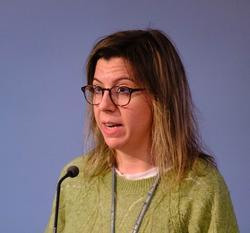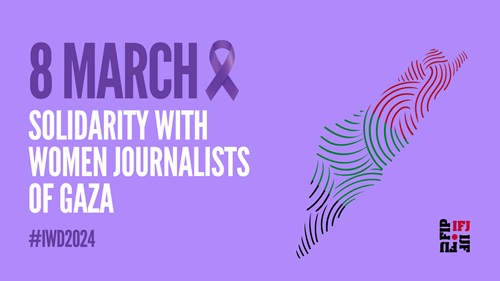#IWD: International Women's Day 2024
Today, the NUJ’s Equality Council launches its #ShowUstheMoney pay transparency campaign, plus a new guide on menopause and the workplace and as NUJ delegates take part in the Women's TUC conference.

Michelle Stanistreet, NUJ general secretary, said: “On International Women’s Day, I send a message of solidarity to all the trade unionists striving to make the world of work a more equal, inclusive and safer place. The union is about to launch a safety tracker where media workers can log incidents of abuse and harassment, so we can provide better protection for journalists and show perpetrators they can no longer get away with what they are doing.
“Today, we are launching the Equality Council’s campaign for greater pay transparency, so that women and other groups have a firmer and fairer footing when negotiating their salaries, particularly when starting a new job or pitching for work. The research shows it has benefits for employers too.
“Our new guide on menopause and the workplace is incredibly informative and has lots of very practical advice to support women and help reps to have constructive conversations with employers to put in place company-wide menopause policies. It’s about time this natural phase of women’s lives isn’t merely the butt of jokes or viewed as taboo.
“I send greeting to our delegates at the Women’s TUC conference who have been speaking about the threats posed to women by AI, online abuse of women, work menopause policies, stereotyping of women in the arts and media, how the NUJ is supporting members experiening online abuse and inadequate PPE for women reporting in conflict zones.
"Likewise, I send best wishes to all the delegates at the Women’s ICTU Conference in Athlone. Good luck, however and wherever you are celebrating International Women’s Day, and don’t forget to voice your support on social media #IDW2024.”
Date for the diary: a #ShowUstheMoney online event with an expert panel to discuss how greater pay transparency can make job recruitment more fair is on Tuesday 23 April at 6pm.
Ask your MP to sign the Early Day Motion 476 Pay transparency, supporting the campaign.
Why we need greater pay transparency
Look at any jobs page for the media and publishing and one phrase will become very familiar – “competitive salary”.
Many news and publishing organisations are very coy about the salary of the job they have advertised. People who respond by filling in a job application form could also find a question asking them what their present salary is.
Come the job interview it isn’t unusual to find yourself negotiating your starting salary. If you start low, this can affect your future earnings.
Research shows that this approach disadvantages women, disabled workers and black and minority ethnic workers. That is why the NUJ is working with other organisations such as the recruitment company Liberty Hive to lobby for companies to provide a guide to the salary offered and to outlaw asking questions about people’s previous salaries.

Cristina Lago, joint chair of the NUJ's Equality Council, said: "Lack of pay transparency in job adverts is a widespread practice among many employers and it continues to widen the already great pay inequalities between workers. Women, disabled, black and minority ethnic professionals are disproportionately affected by this unfair system.
“Journalists and media workers spend countless hours and resources working on applications for jobs that might not be remunerated fairly or according to their experience and skills. We need to put a stop to this discriminatory practice and instead promote transparency of salaries in the recruitment process.
“Through the #ShowUstheMoney campaign we ask employers to ensure any job advertised includes salary details. Research shows this produced better results for them, so there are no excuses left for companies not to be straightforward about how much they are willing to pay new recruits.”
The words ‘commercially sensitive’ are often the go to response on salary secrecy from some employers within the media industry, and there are no laws in the UK that force businesses to share the salary details of their employees. Employees are often discouraged by employers from talking about their pay. Secrecy can allow discrimination to flourish dividing the workforce.
The Equality Act 2010 prevents the enforcement of pay secrecy clauses in employee contracts which seek to stop employees from discussing pay information when trying to uncover differences in pay that may be linked to discrimination. Gender Pay Gap (GPG) reporting continues to be the mechanism whereby employers with over 250 employees are required to report on their GPG. While GPG reporting is not the same thing as equal pay, it can be an indication the pay parity is a problem within an organisation.
The UK gender pay gap for fulltime workers is 14.3 per cent, but the gap among higher earners and older women is much larger. The gender pay gap in FTSE boardrooms still stands at 70 per cent, with average pay for female directors at £309,000, compared to £1.04 million for men. The latest EUROSTAT figures (2021) show Ireland’s gender pay gap is 11.3 per cent. Lack of pay transparency is one of the causes of the GPG.
According to 2023 research by XpertHR, only 50 per cent of UK firms include salary details on all of their job ads, with fewer than a third (29 per cent) of employers including salaries on ‘some’ job ads.
Liberty Hive research shows:
- 75 per cent of candidates would be more likely to apply for a role that included a salary range.
- 62 per cent of candidates believe they should not be asked about their current or past salary in an interview and this figure increases to 73 per cent amongst Asian workers and 75 per cent for black workers.
- 57 per cent of women and 54 per cent of men felt less positive about a potential employer when they were asked the salary history question.
- 21 US states have legislation banning employers from asking about salary history. Direct side-by-side comparisons of these states with their neighbours over three years revealed that the move resulted in an average 8 per cent pay increase for women and a 13 per cent pay increase for black employees. Turnover rates stayed the same, suggesting that organisations can still hire suitable candidates as efficiently as they could previously.
- Denmark: A research study found the pay transparency legislation closed the gender pay gap by 13 per cent.
Liberty Hive has found that being more transparent about pay can also benefit employers.
- When salaries are displayed, the response time is over 50 per cent quicker.
- A post that displays a salary receives around 67 per cent more applications than one that does not.
- Since we introduced our new salary bands on the Liberty Hive Platform over 65 per cent of our clients openly post compensation.
- Jobs posted without any indication of compensation makes the matching process 45 per cent less effective as it results in a greater variation in experience of applicants.
Employers may say that posting salary range publicly could also be of benefit to competitors.The Liberty Hive pay transparency guide suggests that if this is a problem this information could be shared with job candidates and not made available to view for other media businesses.

Natasha Hirst, NUJ president said: "Low pay and insecure contracts for early career workers are a scourge on our industry with pay gaps present from the start. Lack of pay transparency compounds these inequalities as workers try to progress their careers, resulting in the loss of talented women and diverse groups from journalism, publishing and other media roles. The time for fairness and transparency is well overdue, we call on employers to show the salary/display the pay."
When the government launched its pay transparency in 2022, it said evidence shows listing a salary range on a job advert and not asking applicants to disclose salary history provides a firm footing for women to negotiate pay on a fairer basis. “This could have a significant impact in closing salary gaps and tackling pay inequality,” it said.
"Salary transparency: employers, if you do one thing in 2024 to demonstrate your commitment to inclusivity – consider this." #ShowUstheMoney @nujofficial @Liberty_Hive

© Christina Shepherd Design
Menopause is a workplace issue
One in three women has either experienced or is currently going through the menopause. Around 8 in 10 women will experience noticeable symptoms and of these 45 per cent will find their symptoms hard to deal with. The NUJ has published a new guide to inform reps and workers about the menopause, helping members with practical ways to cope with it at work and to put in place company-wide policies which offer workplace adjustments and sources of support.
Solidarity with journalists in Gaza
Thirteen women journalists have already lost their lives in Gaza, according to IFJ data. Others are exposed to the daily lack of security and safety.

Men still at the top in journalism
The latest Reuters Institute study of the gender breakdown of top editors in a sample of 240 major online and offline news outlets in 12 markets across five continents shows that only 24 per cent of the 174 top editors across these 240 brands covered were women, despite the fact that, on average, 40 per cent of journalists in these markets were women. In 2023, this figure was 22 per cent across the same markets.
Among the 33 new top editors appointed across brands covered this year and last, 24 per cent were women. In all 12 markets, the majority of top editors were men, including in countries where women outnumber men among working journalists
